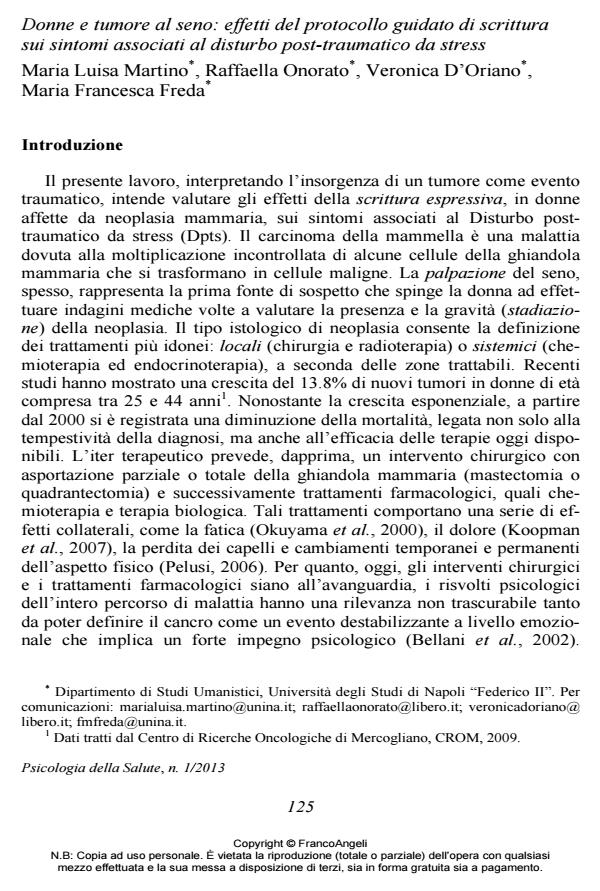Women and breast cancer: effects of guided. Written disclosure protocol on post-traumatic stress
Journal title PSICOLOGIA DELLA SALUTE
Author/s Maria Luisa Martino, Raffaella Onorato, Veronica D'Oriano, Maria Francesca Freda
Publishing Year 2013 Issue 2013/1
Language Italian Pages 12 P. 125-136 File size 317 KB
DOI 10.3280/PDS2013-001007
DOI is like a bar code for intellectual property: to have more infomation
click here
Below, you can see the article first page
If you want to buy this article in PDF format, you can do it, following the instructions to buy download credits

FrancoAngeli is member of Publishers International Linking Association, Inc (PILA), a not-for-profit association which run the CrossRef service enabling links to and from online scholarly content.
Breast cancer appears as a traumatic event that undermines the sense of continuity and integration of own life story often producing psychopathological outcomes. In the expressive writing paradigm this paper assesses the effect of the Guided Written Disclosure Protocol on symptoms associated with post-traumatic stress disorder among 40 women with breast cancer in post-operative drug treatment - 20 under chemotherapy and 20 under biological therapy - through repeated measurements over time of test IES-R. We have performed a series of Repeated Measures Anova. Among the women who have benefit from writing protocol the results show a significant reduction in the intrusion and irritability subscale scores in comparison between sperimental/control group over time. On the contrary, among the control group the increasing trend of the intrusion and irritability subscale scores would suggest that the flow of time, without a psychological space of support, isn’t a "natural remedy" against psychological distress. In addition, the analysis shows that the experiences related to the different therapeutic phases do not affect the possibility to benefit of writing. Within the present study the protocol of writing is configured, therefore, as a useful support tool during the different phases of therapy, which in synergy with medical care, allows to contain the effects of the trauma and to perform, in this way, a preventive function. To promote health, not only after recovery, but since the beginning of the illness.
Keywords: Breast cancer, trauma, writing technique, post-traumatic stress disorder
- Possible use in psychology of threshold concept in order to study sensemaking processes Raffaele De Luca Picione, Maria F Freda, in Culture & Psychology /2016 pp.362
DOI: 10.1177/1354067X16654858 - Percezione delle qualità affettive ambientali e livello di stress in Radiologia Senologica: effetto di un intervento di umanizzazione pittorica Francesca Agostini, Erica Neri, Maria Silvia Sfondrini, Stella Pedilarco, Sally Galotti, Fiorella Monti, Marianna Minelli, in PSICOLOGIA DELLA SALUTE 3/2018 pp.95
DOI: 10.3280/PDS2018-003005 - Linguistic Markers of Processing Trauma Experience in Women’s Written Narratives During Different Breast Cancer Phases: Implications for Clinical Interventions Maria Luisa Martino, Raffaella Onorato, Maria Francesca Freda, in Europe’s Journal of Psychology /2015 pp.651
DOI: 10.5964/ejop.v11i4.991 - Gli Interventi Assistiti dagli Animali come processi di promozione della salute. Una review sistematica Francesca Dicé, Antonio Santaniello, Federica Gerardi, Alda Paoletti, Paolo Valerio, Maria Francesca Freda, Lucia Francesca Menna, in PSICOLOGIA DELLA SALUTE 3/2018 pp.5
DOI: 10.3280/PDS2018-003001 - Meaning-making process related to temporality during breast cancer traumatic experience: The clinical use of narrative to promote a new continuity of life Maria Luisa Martino, Maria Francesca Freda, in Europe’s Journal of Psychology /2016 pp.622
DOI: 10.5964/ejop.v12i4.1150 - Promoting post-traumatic growth in cancer patients: a randomized controlled trial of guided written disclosure Valentina Cafaro, Elisa Rabitti, Giovanna Artioli, Massimo Costantini, Francesco De Vincenzo, Francesca Franzoni, Silvio Cavuto, Tatiana Bertelli, Giuseppe Deledda, Angela Piattelli, Lisa Cardinali, Silvia De Padova, Sara Poli, Maria Domenica Iuvaro, Giovanna Fantoni, Silvia Di Leo, in Frontiers in Psychology 1285998/2024
DOI: 10.3389/fpsyg.2024.1285998 - Una vita senza vita. Pazienti con patologia oncologica mammaria in follow up Florencia Gonzalez Leone, Immacolata Di Napoli, Daniela Barberio, Francesco De Falco, Caterina Arcidiacono, in PSICOLOGIA DELLA SALUTE 3/2019 pp.54
DOI: 10.3280/PDS2019-003004 - Modal articulation: The psychological and semiotic functions of modalities in the sensemaking process Raffaele De Luca Picione, Maria Luisa Martino, Maria Francesca Freda, in Theory & Psychology /2018 pp.84
DOI: 10.1177/0959354317743580 - Meeting the emotion! Application of the Federico II Model for pet therapy to an experience of Animal Assisted Education (AAE) in a primary school F. Dicé, A. Santaniello, F. Gerardi, L.F. Menna, M.F. Freda, in Pratiques Psychologiques /2017 pp.455
DOI: 10.1016/j.prps.2017.03.001 - Underfifty Women and Breast Cancer: Narrative Markers of Meaning-Making in Traumatic Experience Maria Luisa Martino, Daniela Lemmo, Anna Gargiulo, Daniela Barberio, Valentina Abate, Franca Avino, Raffaele Tortoriello, in Frontiers in Psychology 618/2019
DOI: 10.3389/fpsyg.2019.00618 - Trauma narratives and healing of offspring caregivers of breast cancer patients: a mixed qualitative methods study Yifan Zhao, Xueli Qiu, Ziang Xiao, Michelle R. Kaufman, in BMC Psychology 1395/2025
DOI: 10.1186/s40359-025-03854-y - Health and Writing Maria Francesca Freda, Maria Luisa Martino, in Qualitative Health Research /2015 pp.348
DOI: 10.1177/1049732314551059 - Understanding Cancer Patients’ Narratives: Meaning-Making Process, Temporality, and Modal Articulation Raffaele De Luca Picione, Maria Luisa Martino, Maria Francesca Freda, in Journal of Constructivist Psychology /2017 pp.339
DOI: 10.1080/10720537.2016.1227738 - Mirroring in Group Counseling: Analyzing Narrative Innovations Giovanna Esposito, António P. Ribeiro, Miguel M. Gonçalves, Maria Francesca Freda, in Small Group Research /2017 pp.391
DOI: 10.1177/1046496417697149
Maria Luisa Martino, Raffaella Onorato, Veronica D'Oriano, Maria Francesca Freda, Donne e tumore al seno: effetti del protocollo guidato di scrittura sui sintomi associati al disturbo post-traumatico da stress in "PSICOLOGIA DELLA SALUTE" 1/2013, pp 125-136, DOI: 10.3280/PDS2013-001007